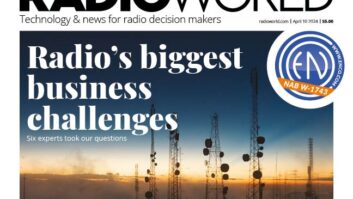
I once had the pleasure of purchasing airtime on a direct competitor’s radio station to promote our new morning show.
How did I do it? I planned it!
I’ll tell you how in just a moment, but first I’d like to make the point that the launch of a new morning show — or a totally new radio station — is a moment in time most of us rarely get to see over the span of our careers. These opportunities are precious and must not be wasted.
‘They’ll love us’
I feel sorry for managers who flip a switch, use the word “new” and expect the market to find and love the product immediately.
When you hear someone tell you that “we’re doing a soft launch,” you’re really hearing code for “We don’t know what we’re doing and we have no plan,” and “People will find us when they scan the dial and they’ll love the new us.”
Another lame excuse you’ll encounter revolves around not having enough time: “We’ve got to get this on right away. If word leaks out in the market, someone may beat us to the punch.”
Your launch plan starts with a timetable. That timetable begins at the end of your research and extends to approximately six months after your launch date.
(You researched the niche you’re about to fill, right? If your answer is no — read: “no budget” — you’re embarking on a dangerous mission with limited intelligence … and yes, the pun is intended.)
As soon as the research is complete and your format decision is made, the search begins for talent, beginning with your morning show. This assumes you already have the right program director for the format.
Hopefully your format consultant (in or out of house) knows the playing field already and presents you a short list of prospects.
A word of caution: Never try to convince a talent the job is right for them. If they’re not on fire to come to you, most of the time you’re asking for trouble. So much of talent success has to do with personal motivation; the last thing you want is a laundry list of complaints when they don’t achieve instant success.
And while you start your launch with a morning show, don’t stop there. Hire someone — even if it’s voice-tracking — for every daypart. Don’t fall back on the “we don’t have time” or “we’ll do that later” excuse.
At the stage you’re searching for talent, you’re laying out the marketing plan. The actual execution of this plan does not begin until the station is on the air. It makes no sense to blow money telling people that a product is coming when they can’t sample it yet.
If you have no budget, you will have no serious share of advertising voice — and while I will recommend some inexpensive methods of getting the word out, there is no substitute for real marketing using mass media, no matter the market size.
In your mix of advertising the new product, try to own a medium. Don’t spread yourself thin by buying a few TV spots, a couple of billboards, a bit of direct mail and some transit.
Instead, buy all the billboards you can afford and no TV. Or put it on three TV channels with a lot frequency.
The one exception is laying out some dough — you don’t need a lot — on Google search words that fit your new format and your new website. For many that will mean buying the core format artists. The good news is that although you’ll pay for clicks, now you’re at least hitting potential listeners.
Put the word out
Inexpensive marketing methods to consider include:
- A Facebook campaign — beginning with sign-on and offering a fantastic prize, like the chance to win a (traded) car for everyone who “likes” your Facebook page.
- Talent appearances at any major event they can host.
- Traded spots with your local cable company.
- Promos or coverage on your other cluster radio stations when you’ve got alignment that makes sense. For example, if you have a talk or news station and you’re launching a music station, you will be able to move cume and it won’t sound out of place, as it might on another music station.
If it fits the new format to do so, map out a few stunts that will draw attention. Pace them over a few months. They don’t all have to be outrageous. A stunt can be a simple as setting up a bed in the middle of busy shopping center and doing a broadcast from it on Saturday from 10 a.m. to 2 p.m.
Other items to map out include your sales tactics, complete with client launch party; media partners with whom you can exchange content or trade marketing; and public relations outreach with newspapers, websites and non-profits.
So … how did I manage to promote a new morning show on a competitor’s station?
A morning show and a cup of coffee have a lot in common. They wake you up. Both can be bold. People will want to sample each one every morning.
We wrote the commercial using the talent names as the coffee brand. I hired an agency to place the ads. I waited until the first ad ran and then called the local newspaper to tell them the story about how we pulled a fast one on a competitor.
The spot got yanked immediately, but we got ink and buzz. And yes, we did make and sell the coffee — with the proceeds going to a local charity.
Mark Lapidus is president of Lapidus Media. Contact:[email protected]. Promo Power articles are archived atradioworld.com.












